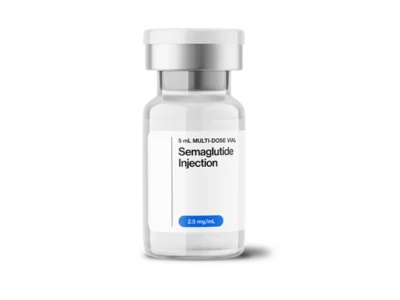- Home
- Growth Hormone
- Growth Hormone
- Growth Hormone Deficiency
- Growth Hormone Therapy
- Growth Hormone Injections
get startedThe Most Effective Hormone Replacement TherapiesWho Should Not Take Semaglutide
Semaglutide, the active ingredient in many of the latest weight loss drugs, can provide remarkable weight loss for many obese adults, but it is not for everybody or without its adverse reactions.
Semaglutide belongs to a class of drugs known as GLP-1 agonists also known as Incretin Mimetics, that are having a transformative effect in treating adults with obesity. These drugs mimic a natural hormone that controls appetite and satiety.
Because of these dual effects, semaglutide treatment can provide substantial weight loss; however, there are certain groups of people who should not take this type of medicine, particularly those with certain pre-existing health conditions.
People who should not take injectable semaglutide or take special precautions during its use include:
- Those who may have certain allergies.
- Those who have certain medical conditions or a family history for certain medical conditions.
- Those who are more predisposed to this drug’s side effects.
- Those who are subject to any of this drug’s contraindications or drug interactions.
Semaglutide Contraindications, Warnings, and Side Effects
Semaglutide has ushered in a revolution in weight loss. In clinical trials, participants, along with a healthy diet and exercise, lost as much as 16% of their total body weight. However, as effective as it is, there are people who should not take GLP-1s, and like any drug, it is not without its contraindications, warnings, and side effects.
Semaglutide Contraindications and Warnings
Here is a breakdown of the warnings, precautions, and contraindications for this medication.
Semaglutide Contraindications: General Precautions
Key contraindications include a history of medullary thyroid carcinoma or multiple endocrine neoplasia syndrome type 2, which heighten thyroid risks.
Before using this drug as an injection for weight loss, tell your doctor or pharmacist about any allergic reactions to any medication you may have had in the past.
Before taking semaglutide injections, tell your prescriber or healthcare provider if you or your family has a history of diabetic retinopathy, pancreatitis, gallbladder disease, kidney disease, or stomach/intestinal disorders. People with diabetes should always check with their doctor before using GLP-1s. This drug should be prescribed with caution for adults with type 2 diabetes.
Caution should be exercised in patients with a history of pancreatitis.
This class of medications can cause blurred vision, dizziness, or drowsiness. Do not drive, use machinery, or do anything that needs alertness or clear vision until you are sure you can perform such activities safely while using this medication.
This drug is not used to treat type 1 diabetes or diabetic ketoacidosis.
Avoid the use of alcohol while taking semaglutide injections.
Semaglutide Contraindications Regarding Pregnancy and Breastfeeding
Studies have found that this class of medications may increase the risk of birth defects, low birth weight, miscarriage, and other complications. Women may seek weight control when expecting; however, even if you are overweight, losing too much weight during pregnancy could harm the unborn baby. Animal studies have shown potential harm to the fetus, but human studies are limited. The product labels for these medications recommend stopping use two months before becoming pregnant. Studies suggest that this drug does not cross into human milk, and breastfeeding mothers are not among those who should not take semaglutide.
Semaglutide Contraindications: Drug Interactions
Like all medications, interactions with other drugs you may be taking could lessen the effectiveness of semaglutide or create health threats that put you in the population of people who should not take it. Tell your doctor about any medications you are using before accepting a prescription for this medication.
Beta-blocker medications should not be used with this drug unless authorized by your prescriber.
This drug could affect blood sugar levels. Tell your healthcare provider if you are taking other medicines to treat diabetes, including sulfonylureas or insulin.
Do not use this medication with any other product that contains semaglutide.
Other drugs may affect semaglutide, including prescription and over-the-counter medicines, vitamins, and herbal products. Be sure to tell your doctor about all medications and supplements you are taking before starting on this weight loss therapy.
What Are the Main Side Effects of Semaglutide?
When you are taking this drug, it is not uncommon to experience some side effects or adverse reactions. Most side effects are mild and easily mitigated. The most important thing is to make your prescriber aware of any side effects you are experiencing right away so that proper interventions and monitoring can be done to reduce or eliminate those complications.
Common Side Effects
This medication is given via subcutaneous injection. Therefore, one of the most common adverse events is injection site reactions. Other than that, the most common side effects are those related to the stomach and the gastrointestinal tract, such as:
- Mild to moderate nausea
- Diarrhea
- Vomiting
- Constipation
- Upset stomach
- Abdominal pain, stomach cramps, and stomach flu-like symptoms.
Nausea, vomiting and all of the above upper stomach and digestive side effects are well-known and quite common among this class of drugs because these drugs – GLP-1 agonists — impact how long undigested food stays in the stomach. Gastrointestinal symptoms usually resolve on their own after a few weeks, or there are many ways to help relieve these kinds of side effects, which you can read more about in the How to Manage Semaglutide Side Effects section.
Other Reported Side Effects During Clinical Trials Included
- Dizziness – Because it causes you to eat less, caloric reduction could lead to a feeling of light-headedness or dizziness.
- Gas and Feeling Bloated – Because of the way it affects undigested food in the stomach, it can cause gas and a feeling of bloating.
- Heartburn – Because of the way that the medication affects digestion, it can cause heartburn or indigestion.
- Fatigue – Since you eat less than you normally would on this medication taking in fewer calories can make you feel tired.
- Hair Loss – Temporary hair loss, or telogen effluvium, has been reported with this and related drugs such as Ozempic. Why this is true is not really known, but the effects are usually temporary and could have to do with limited vital nutrients that could occur when taking these weight loss injections.
- Slurred speech, sweating, feeling jittery, or shakiness have been reported.
- Allergic and anaphylactic reactions have occurred.
Less Common or Rare Side Effects
The less common or rare side effects of include:
Increased Risk for Thyroid Cancer – Animal studies showed that Semaglutide and drugs like Semaglutide could cause certain types of thyroid tumors. However, these results have not been shown in humans.
Inflammation of the Pancreas (pancreatitis) – Though rare, there were a very small amount of participants in the clinical trials who developed acute pancreatitis. The reasons for this increased risk are unclear, but it most likely occurs in patients who were predisposed to the condition. Let your healthcare provider know before starting if you have a history of acute pancreatitis. They may recommend a different medication for you.
Gallstones – Gallbladder disease such as gallstones has been reported with, but is quite uncommon. It was reported in less than 2% of people taking it in clinical trials. Again, like pancreatitis, gallstones probably occur in patients who are already predisposed to develop them. Be sure to tell your doctor if you or anyone in your family has a history of gallstones.
Low blood sugar (hypoglycemia) – Low blood sugar is a fairly uncommon side effect when taking this drug on its own. However, it has occurred in patients who are taking it in addition to insulin or other drugs used to manage diabetes.
Depression or suicidal thoughts – In some very rare instances, people on other weight loss drugs reported feelings of depression or suicidal thoughts. While this came up below statistical note in the clinical trials, it remains a potential side effect of this medication.
If You Cannot Take Semaglutide, Are There Any Alternatives?
For those who cannot take this drug for any of the reasons we have discussed, there may be an alternative for you. Most of the other weight loss drugs that have been approved since the introduction of semaglutide share the same active ingredients and mechanisms of action. Therefore, if you have issues with semaglutide contraindications, you will probably have the same issues with Ozempic or Mounjaro.
However, there are a few weight loss drugs that are quite different than this one and could be right for you, such as Xenical or Qsymia. These two drugs target how your body absorbs fat and not appetite and fullness as GLP-1s do.
There is even an “over-the-counter drug that could be good for you if you have issues with the contraindications of semaglutide. Alli is the over-the-counter brand of the formerly prescription-only weight loss drug Orlistat. It is the only non-prescription drug approved for weight management. It works totally differently than semaglutide; rather than impacting appetites, like the other alternative mentioned above it changes the way your body absorbs fat from food.
If you have contraindications for semaglutide or have been experiencing any side effects, speak to your doctor or healthcare provider about these semaglutide alternatives.
Final Thoughts on Safety and Contraindications for Semaglutide
In June of 2021, semaglutide became the first drug of its kind to be approved for weight loss. Others in the same class – GLP-1 agonists – soon followed. Semaglutide and similar drugs have been game changers in the field of medical weight loss and can help many in their weight loss efforts. As such, they are in great demand.
For most patients on GLP-1 medications, the benefits far outweigh the risks. In fact, for most patients, semaglutide has benefits beyond weight management, such as reducing the risk of cardiovascular events such as stroke or heart attack. In fact, these types of drugs have recently been approved as a treatment for the prevention of cardiovascular disease.
However, it is important to keep in mind that while approved and generally regarded as safe, like all prescription drugs, there are people who should not take semaglutide. If you are overweight and have heard all of the buzz about semaglutide, you should never take the drug on your own. Like all prescription medications, semaglutide is not without its risks, side effects, and contraindications.
If you want to use semaglutide as safely as possible, only do so with proper medical supervision. Contact Us; we can help you decide if semaglutide is right for you. Our healthcare team always strives to minimize the potential risks of any medications we prescribe. It is all part of our commitment to putting patient safety above all else.
read this next
Where to Inject Semaglutide. Guide From the Kingsberg Medical
Semaglutide is a popular medication for weight loss. It is given via subcutaneous injections. That means where you inject semaglutide is just below the…read moreWhen Does Semaglutide Start Working?
The general answer to "When does semaglutide start working?" is that it differs somewhat from patient to patient. Semaglutide injections for weight loss are…read moreHow Long Does Semaglutide Stay in Your System?
Semaglutide has been proven in clinical outcomes to be quite effective for weight loss. Medical professionals and clinical trials have found people losing dozens…read moreHow Much Weight Can You Lose on Semaglutide in One Month
Patients suffering from severe obesity can expect to drop a significant number of pounds even during the first month of taking semaglutide. Semaglutide is…read more - Growth Hormone Therapy





























